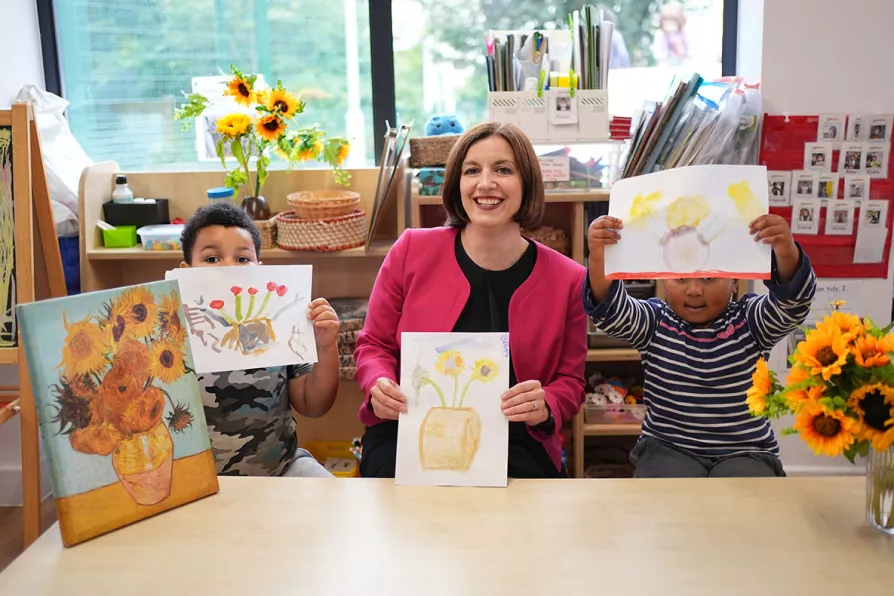
 Education Secretary Bridget Phillipson holding her painting of sunflowers, alongside pupils Wyatt, aged 4 (left), and Aicha, aged 4, during a visit to the school-based nursery at Ark Start Oval, East Croydon, in south London, July 10, 2024
Education Secretary Bridget Phillipson holding her painting of sunflowers, alongside pupils Wyatt, aged 4 (left), and Aicha, aged 4, during a visit to the school-based nursery at Ark Start Oval, East Croydon, in south London, July 10, 2024
EDUCATION SECRETARY Bridget Phillipson’s statement that scrapping the two-child benefit cap will be “considered,” as one of a number of ways to lift children out of poverty, is one reflection of the expectations raised in the working class as a result of Labour’s election victory.
Another is Chancellor Rachel Reeves’s hint that the government might be prepared to meet the reportedly advised pay rises of 5.5 per cent for teachers and nurses, because there is “a cost to not settling.”
That cost, presumably, is not just more industrial action but more of those workers leaving their professions.
During the election campaign, Keir Starmer ruled out ending the two-child cap, on the grounds of cost, but its exclusion from the King’s Speech has threatened the first back-bench revolt of his premiership.
Asked to comment on Phillipson’s statement, he said that “there is no silver bullet” to ending child poverty, adding that there is “a complicated set of factors … to do with pay, to do with benefits, to do with work, to do with housing, to do with education, to do with health.”
That suggests that Sir Keir Starmer may perhaps have read the general election call from the End Child Poverty coalition, for a child poverty strategy which “takes into account wider social determinants — including housing, employment, education, childcare costs and wider economic levers, and sets out how all levels of government can play a co-ordinated role in ending child poverty.”
If he did read that, then it is unfortunate that he did not go further, and agree to the coalition’s other calls, which include “a Bill to set targets relating to the abolition of child poverty, and to make other provision about child poverty,” and — as down payments on the longer-term goal — scrapping the two-child benefit limit, and bringing in a child lock to uprate benefits each year.
There are 4.3 million children — 30 per cent of the total — living in poverty in Britain. It is a scandal that any government should not take decisive action to address that.
There is a degree of smoke and mirrors about the government’s handling of both that issue and public-sector pay. Sympathetic words are being spoken, but at the end of the day, nothing substantive is being promised.
Phillipson qualified her statement about the cap by saying it would be “very expensive” to scrap it, and that a new task force led by herself and Work and Pensions Secretary Liz Kendall would review potential policies to reduce child poverty.
And Treasury Minister James Murray has insisted that the government’s fiscal rules were “non-negotiable,” as he refused to be drawn on whether Reeves would meet the floated 5.5 per cent increase.
The signs are that the government wants to stick as closely as possible to the spending and tax commitments that Labour made in the election campaign while giving the appearance of being sympathetic to the issues.
On Monday the Financial Times reported that Treasury ministers are softening up public opinion for a tough autumn Budget and possible tax rises, after a near £5 billion overshoot in public spending.
On the eve of Parliament’s summer recess, Reeves will present MPs with an assessment of what she claims are recently discovered unfunded spending commitments, as a result of which “there are going to be tough decisions ahead.”
Meanwhile, adding more ruling-class pressure, the IMF has warned that GDP will need to grow by around 2.6 per cent — three times the current rate — every fiscal year to the end of this Parliament if the government is to stabilise public debt without tax rises or spending cuts.
The trade union movement should not sit back and just take such statements at face value. For over 40 years, pay as a proportion of GDP has been falling. Now is the time to put the pressure on for taxes on the big corporations and the super-rich, to fund public-sector pay and an end to child poverty.

Letter to PM outlines best way to reduce hardship











